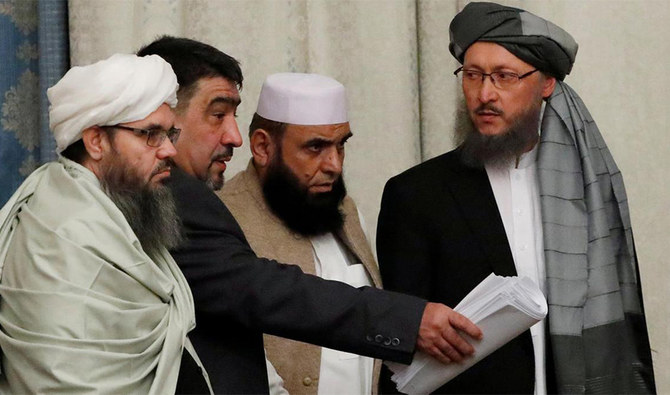PESHAWAR: A day after the Afghan government released three high ranking Taliban leaders in return for an American and Australian hostage, the Taliban on Wednesday said they rejected media reports that claimed the prisoner swap deal was aimed at facilitating talks between the Taliban and Afghan civilian government.
The US-backed Afghan government’s decision to carry out the swap was being perceived as key to securing direct talks with the militant group, which has consistently refused to engage with what they call an illegitimate “puppet” regime in Kabul.
But in its report published on Wednesday, Qatar-based television channel, Al-Jazeera, quoted Afghan President Ashraf Ghani as saying that the decision for the prisoner exchange deal was made after consultations with the US and that the deal was aimed at "facilitating face-to-face negotiations directly with the Taliban.”
Following this, the Taliban’s political office spokesman in Doha, Suhail Shaheen, told Arab News that the Taliban had neither reached the prisoner swap deal indirectly with the Kabul administration nor had they set any pre-conditions for sitting face-to-face for direct talks after the deal had gone through.
“We categorically reject Al Jazeera's Television report that three prisoners of the Islamic Emirate have been released for any deal and upcoming face-to-face talks with the Kabul administration. The report is totally untrue,” Shaheen said.
“The prisoners’ swap took place as a result of our talks with the Americans and should be deemed as a confidence-building measure to pave way for peace in Afghanistan,” he continued.
“Now, it is up to the Americans to move forward with the stalled peace talks, otherwise they (Americans) will be held responsible for the enduring unrest in Afghanistan,” Shaheen added.
Soon after the prisoner swap, Pakistan’s Prime Minister Imran Khan welcomed the release of American and Australian hostages.
The US and Australia confirmed the release of their citizens and expressed hope that the exchange of prisoners might improve chances for dialogue between the Afghans, and an eventual peace agreement.
“The Taliban have indicated that the release of the two professors is intended as a goodwill gesture, which the United States welcomes,” US Secretary of State Mike Pompeo said in a statement on Tuesday.
“We see these developments as hopeful signs that the Afghan war, a terrible and costly conflict that has lasted 40 years, may soon conclude through a political settlement,” Pompeo added.
Pompeo also expressed hope for “the success of intra-Afghan peace negotiations, which the United States stands ready to support.”
The Amerian and Australian hostages, both professors, were kidnapped in August 2016 from outside the American University of Afghanistan in Kabul. They were freed in return for the release of three Taliban commanders including Anas Haqqani, Hajji Mali Khan, and Hafiz Abdul Rasheed after a delayed swap.

















